The FIFA World Cup is the most anticipated event in football as millions of people gather to see the greatest teams battle it out for world football’s ultimate prize. And the final of the World Cup is the most awaited match of the tournament.Over the years, many World Cup finals have been the centre of excitement, drama and controversy with some of the greatest players emerging victorious. Here is a list of the five most dramatic World Cup Finals of all time.
#5 Argentina vs West Germany - 1990
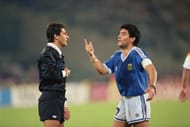
The 1990 FIFA World Cup Final between West Germany and Argentina at Rome is considered to be one of the ugliest world cup finals ever. This was the second consecutive World Cup final to feature both West Germany and Argentina.
West Germany had been in terrific form, going unbeaten throughout the tournament with star players like Lothar Matthaus, Jurgen Klinsmann, Rudi Voller, Andreas Brehme and Pierre Littbarski. Defending champions Argentina started slowly in their group stage but improved as the tournament progressed, beating hosts and favourites Italy in the semi-final. Along with the experience of Maradona, Argentina had an athletic young forward in Claudio Canniggia and a very reliable goalkeeper in Sergio Goycochea.
The final was an ill-tempered affair with the Argentina side being constantly booed owing to skipper Maradona’s controversial comments in the media and the officiating was controversial as well with both Germany and Argentina being denied penalties by Mexican referee Edgardo Codesal for alleged tackles.
In the 65th minute of the match, Argentina defender Pedro Monzon wrote history by becoming the first player ever to be sent off in a World Cup final. Monzon received a straight red card for a foul on German striker Jurgen Klinsmann. West Germany were awarded a controversial penalty in the 85th minute when Roberto Sensini fouled Rudi Voller and Andreas Brehme converted the spot kick to give West Germany the lead.
Few minutes later, Gustavo Dezotti received a second yellow card for bringing down Jurgen Kohler after Kohler refused to give the ball in an attempt to waste time. At the end of the final whistle, West Germany won their third World Cup and Diego Maradona was reduced to tears, blaming referee Codesal for Argentina’s defeat.
The 1990 World Cup final was also the lowest scoring final at the time and Argentina became the first team not to score in a World Cup Final.
#4 Argentina vs Netherlands - 1978
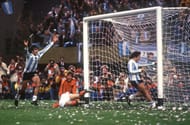
The 1978 FIFA World Cup Final between Argentina and The Netherlands will perhaps be best remembered for a pre-match incident that almost abandoned the World Cup Final. Argentina had shown some brilliant performances throughout the tournament which included a 6-0 drubbing of Peru in their second round game which allowed Argentina to qualify for the final ahead of the Brazilians.
The side boasted of star striker Mario Kempes who had been in terrific form throughout the tournament. The Dutch, on the other hand, had a difficult group stage but were at their very best in the second round, qualifying ahead of Italy, West Germany and Austria. The side were without 1974 star Johann Cryuff but had many star players like Johnny Rep, Ruud Krol, Willy, Rene van de Kerkhof, Arie Haan, Willem van Hanegem, Johann Neeskens and Rob Rensenbrink who had been their star player scoring 5 goals.
The final was played on at Buenos Aires’ Estadio Monumental in front of more than 71,000 people. Argentina arrived on the pitch some seven minutes after the Dutch and once they entered the field, they were responsible for one of the most controversial moments in World Cup history. The argument began about a heavy plaster cast on the arm of Dutch winger Rene van de Kerkhof.
Argentina captain Daniel Passarella said that Van de Kerkhof should not be allowed to play with such a heavy cast as it was solid and dangerous even though he had played his six previous matches with the cast on and no such problem had been reported. Then Dutch captain Ruud Krol and all the Dutch players threatened to leave the pitch if van de Kerkhof was not allowed to play.
Italian referee Sergio Gonella then sorted out the matter by telling Van de Kerkhof to put a sling around it. The match itself was a physical game with occasional pieces of brilliance being outnumbered by violence. Argentina went on to win the match 3-1 with two goals from Mario Kempes, who pipped Rensenbrink to the Golden Boot before Daniel Bertoni added a third.
Though the match had a number of close calls, the final will always be remembered for that incident which delayed the start of the final by more than 10 minutes.
#3 England vs West Germany - 1966
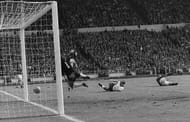
The 1966 World Cup Final was one of the most dramatic and controversial finals of all time. Hosts England were at their very best and had a very strong squad including the likes of skipper Bobby Moore, Gordon Banks and Bobby Charlton who were leading exponents of their respective positions at the time. Their opponents were a West German side who had been equally dominating with a squad consisting of captain and star striker Uwe Seeler, Karl-Heinz Schnellinger and a young but talented Franz Beckenbauer who had scored 4 goals in the tournament.
The final was held at Wembley in front of a crowd of more than 96,000 people. West Germany drew first blood through Helmut Haller after just 12 minutes. England equalized with Bobby Moore’s cross found the head of Geoff Hurst. England then got the lead in the 77th minute when Alan Ball’s corner was deflected by Geoff Hurst and Martin Peters found the net.
Germany were given a last throw of the dice in the 89th minute when Jack Charlton conceded a free kick. The kick was taken by Lothar Emmerich which struck into the wall and the rebound shot taken by Siegfried Held struck into the body of Karl-Heinz Schnellinger and eventually fell to Wolfgang Weber who scored to level the scores 2-2 despite claims of a handball by goalkeeper Gordon Banks.
After 11 minutes of extra time, Alan Ball sent in a cross which Geoff Hurst shot from close range. The ball hit the underside of the crossbar, bounced on the line and was cleared. After communication between the referee and the linesman, the Swiss referee Gottfried Dienst awarded the goal to England. Then in the final minute of play, West Germany sent their defenders up front in pursuit of an equalizer.
On winning the ball, Bobby Moore sent the ball to Geoff Hurst who was making his run towards the West German goal when some spectators started to come on the field thinking that the match was over and Hurst scored England’s fourth goal to secure England’s first ever World Cup victory and to become the first and, as of now, the only player to have scored a hat-trick in a World Cup final.
England’s third goal in the final still remains controversial with some people citing a possible bias of Soviet linesman Tofiq Bakramov (as West Germany had beaten Soviet Union in the semi-final). When England had a legitimate Frank Lampard goal disallowed against Germany at the 2010 World Cup, many people said that it was revenge for the incident of the 1966 Final.
Read more about the controversial goal here: Iconic moments in football history – Geoff Hurst’s ‘Ghost Goal’
#2 West Germany vs Hungary - 1954
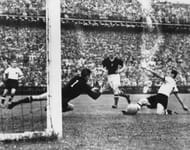
The 1954 World Cup Final was the first World Cup final in which both finalists had met each other earlier in the tournament. The match featured Hungary, who were considered favourites. They were on a 32-match unbeaten streak in five years and had their famous Magical Magyars squad which boasted of skipper Ferenc Puskas, considered the best player in the world at that time, Sandor Kocsis, Nandor Kidegkuti, Zoltan Czibor, Jozsef Bozsik and goalkeeper Gyula Grosics.
The Hungarians had such a great tournament that even with Puskas ruled out of two matches due to injury, they beat last edition’s runners-up Brazil in the quarter-finals and defending champions Uruguay in the semi-final. Their opponents were a West German side whom they had beaten 8-3 in the group stages and had to qualify for the quarter-finals through a playoff against Turkey.
However, West Germany fared well in the knockout stages beating Yugoslavia 2-0 and then thrashing Austria 6-1 in the semi-finals. The side boasted of quality players like Fritz Walter, Helmut Rahn, Max Morlock and Hans Schafer.
The final began with Hungary attacking from the very first minute and captain Ferenc Puskas scored after just six minutes to break the deadlock. Within two minutes, Hungary were 2-0 up thanks to Zoltan Czibor. West Germany showed immediate retaliation and Max Morlock pulled one back in the 10th minute. Then Helmut Rahn equalized for the Germans eight minutes later.
The scores remained 2-2 at half time with both teams having missed several chances to take the lead. In the second half, Hungary had several shots on goal but they were foiled time and again by German goalkeeper Toni Turek. With six minutes left, West Germany finally took the lead through Helmut Rahn who scored his second of the tournament. Two minutes before time, Puskas scored but his goal was ruled offside.
West Germany pulled off one of the upsets of all time by beating perhaps the greatest Hungarian side ever. However, the match remains controversial to many. One being the equalizer for West Germany in which Hans Schafer obstructed Hungarian goalkeeper Gyula Grosics and the ball reached Helmut Rahn.
Another controversy is rumours that German players had been injected with performance enhancing substances, allegations which the German players denied stating that these were glucose injections to cure jaundice which some players had fallen ill with owing to a contaminated needle. The biggest controversy is the offside ruling of Ferenc Puskas’ late shot as many people including a German substitute Alfred Pfaff claim the referee to be wrong regarding the offside decision.
Read more here: Iconic World Cup Moments – When the Golden Team were miraculously defeated at Bern
#1 Brazil vs Uruguay, 1950
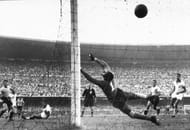
One of the most dramatic World Cup matches ever, the Brazil-Uruguay match of the 1950 wasn’t actually a final but this match would decide the fate of the tournament. The 1950 World Cup was to be decided by a second round robin consisting of all the four group winners in the first round. The four remaining teams were Brazil, Uruguay, Sweden and Spain.
Hosts Brazil had been in scintillating form beating Spain and Sweden 6-1 and 7-1 respectively and coming into their final group game as the first placed team. Throughout the second round robin stage, Uruguay had been dependent on late goals. Skipper Obdulio Varela securing a point for them against Spain and two late goals from Oscar Miguez kept the Uruguayans in contention for the World Cup as they were just a point behind Brazil.
In their final game, Brazil just needed to avoid defeat to win the World Cup whereas Uruguay needed to defeat Brazil to be crowned champions. However, a loss for Uruguay and a win for Spain against Sweden would see Uruguay end on third place behind Spain. Prior to the final, celebrations had begun all over Brazil as Brazil had won their previous two matches in a very convincing manner and were playing a very attacking style of football.
The day was 16th July1950. The streets of Rio de Janeiro were full of excitement with thousands of people already celebrating. A Brazilian newspaper O MUNDO printed an edition which had a photograph of the Brazilian team with the caption “These are the world champions”.
Before the start of the game Uruguayan coach Juan Lopez advised Uruguay to play in a defensive manner. After he left, Uruguay captain Obdulio Varela told his players “Juan is a good man, but he is wrong. If we play defensively against Brazil our fate will be more or less same as Spain or Sweden.” The match began with Brazil attacking every moment, but Uruguay were quite resilient and the scored remained scoreless at half-time.
In the second half, Friaca gave Brazil the lead in the 47th minute although Uruguayan skipper Varela claimed he was offside. However, when Uruguay started attacking, the Brazilian defence was exposed and Juan Alberto Schiaffino equalized in the 66th minute but Brazil would still win the World Cup if the scoreline remained unaltered.
Disaster struck for Brazilin the 79th minute when Alcides Ghiggia gave Uruguay the lead and silenced a record crowd of 200,000 at the Estadio Maracana. Uruguay were crowned World Champions in the second time in their history after pulling off the greatest upset of the tournament.
Full story of Maracanazo: Iconic World Cup Moments – When Uruguay silenced the Maracana
